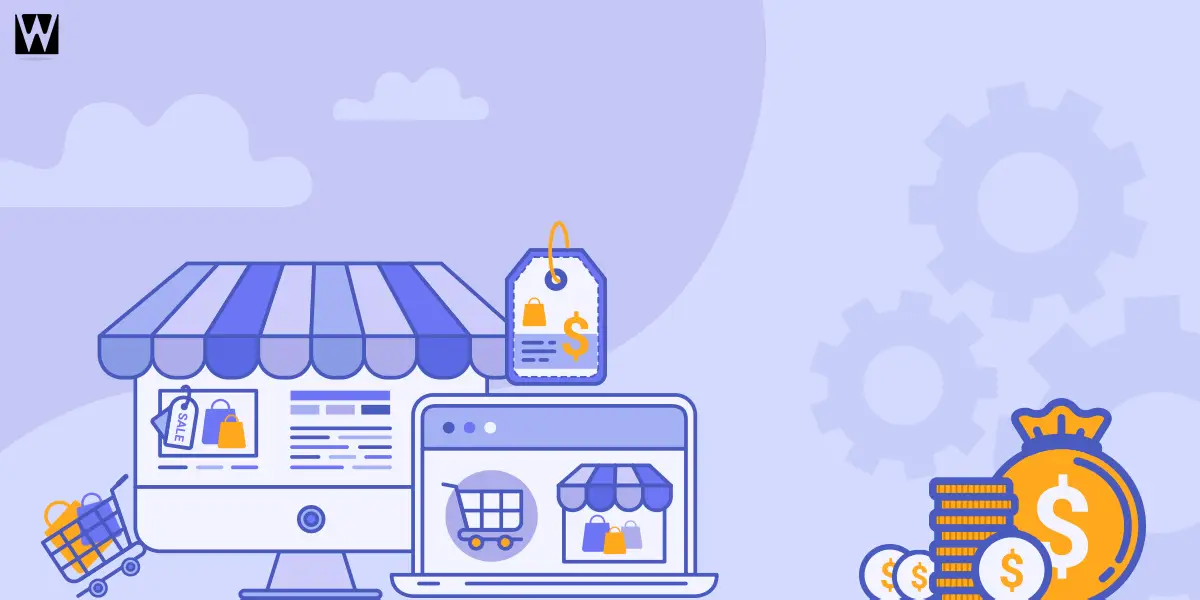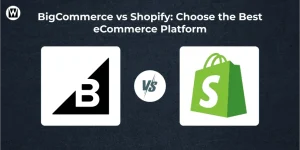How Much Does An Ecommerce Website Cost In 2026 [A Complete Pricing Guide]

Key Points
- •Building an eCommerce website costs $1,500 to $200,000+ based on platform, features, and complexity.
- •Website builders are budget-friendly; custom development offers full flexibility at a higher price.
- •Major cost drivers include design, development complexity, hosting, domain registration, payment gateways, marketing, SEO, integrations, content creation, website maintenance, and scalability requirements.
The internet has transformed the way we shop and conduct business. Online shopping has become increasingly popular as millions of people turn to e-commerce platforms for their purchasing needs.
In fact, it is estimated that the e-commerce market is expected to be $8.5 trillion in 2026 and continue to grow.
Recognizing the importance of this trend, business owners and entrepreneurs are starting to sell their products or services online.
So, if you are exploring the e-commerce business, the first thing to do is to build an e-commerce website.
But one crucial question that often arises is, “How much does an e-commerce website cost?”
As a leading e-commerce website development company, we understand the importance of this question.
In this blog post, we aim to provide you with a complete e-commerce website pricing guide. It will serve as a valuable resource to calculate the price for an ecommerce website.
Let’s get started.
How Much Does an Ecommerce Website Cost?
- Registration of Domain: $10 to $30 annually
- Web Hosting: $5 to $250 monthly (depending on the hosting plan and provider)
- SSL Certificate: $0 (free of charge with some hosting providers) to $200 annually
- Ecommerce Platform:
- Open-source (WooCommerce, Magento): Download for free. There might be a charge if you use any paid plugins, themes and extensions.
- Hosted solutions (Shopify, BigCommerce, or Wix): $20 to $300 monthly, based on the plan and features.
- Website Design and Development:
- Prebuilt Themes: It will cost around $0 to $200
- Custom Design & Development: The cost is around $2,000 to $20,000 or more. It depends on the features, functionality, and complexity of your website.
- Additional Costs To Consider:
- Payment Gateway Fees: According to the provider and transaction volume, cost can vary. For example, PayPal charges 2.9% + 30¢ for transactions over $10. Other providers like Stripe and Shop Pay have their own charges.
- Digital Marketing & Advertising: E-commerce marketing costs are around $2,500 to $12,000 per month covering strategies like SEO, paid advertising, and social media campaigns. However, cost differs as it depends on the budget and marketing strategy of the business.
- Website Maintenance & Support: Website maintenance for ecommerce sites can cost approximately 15% to 25% of the initial development cost annually. The cost varies based on the required maintenance support.
Partner with us for expert guidance in launching and managing your online store. Reach out today to take the first step toward your thriving digital presence.
Factors That Affect the Cost of an Ecommerce Website

1. Domain
The domain name is the first essential factor to consider when estimating the cost of an e-commerce website.
A domain is the unique web address that users will use to access your website. Buying a domain name typically costs between $2 and $20 per year.
The price can vary depending on the extension (.com, .net, .org), where you buy from and the popularity of it.
You can buy a domain for up to 10 consecutive years, which will cost up to $50 to $150. It is recommended to register your domain for years in advance as it helps you secure your online identity, improve rankings and save more costs in the long term.
| Registrar | Starting Price (per year) | Unique Benefits |
|---|---|---|
| Namecheap | $5 – $15 | Free WHOIS privacy, affordable renewals, simple UI |
| GoDaddy | $10 – $20 | Large marketplace, frequent discounts, domain auctions |
| Google Domains (now Squarespace Domains) | $12 – $20 | Easy integration with Google Workspace, transparent pricing |
| Bluehost | Free (1st year with hosting) | Free domain for 1 year, bundled with hosting plans |
| Hover | $10 – $20 | Clean interface, free WHOIS privacy, no upselling |
| Domain.com | $10 – $25 | Wide extension options (.tech, .store, etc.), competitive pricing |
| Dynadot | $8 – $15 | Bulk discounts, flexible management tools |
2. Hosting
Hosting means it’s a server space where your website files are stored and made accessible to visitors.
The estimated cost of web hosting starts from $2.75 to $1,000 or higher per month. The cost depends on factors like the hosting provider, the type of hosting, the storage capacity, and the additional features provided.
When it comes to eCommerce hosting, there are two choices available:- Self-hosted eCommerce Platforms
- Saas eCommerce Platforms
Self-hosted eCommerce Platforms
The estimated cost for a self-hosted eCommerce platform is around $2.75 – $2,000 per month.
Few eCommerce website builders like WooCommerce and Magento are free. You only need to have an account with an eCommerce hosting provider to manage your files and buy a domain.
The website hosting plan for beginners starts at $7.99 per month, the domain name $14.99 per year and the SSL certificate starts from $69 per year.
Web hosts like Bluehost offer affordable services with a free domain and SSL certificate for $2.75 monthly.
One thing to consider in a self-hosted eCommerce website is when your business starts growing, you need to update your hosting plan to handle more traffic. It can cost you around $100 to $1,000 per month.
SaaS eCommerce Platform Hosting
The estimated cost for SaaS ecommerce is around $29 to $399 per month.
Ecommerce platforms like Shopify and BigCommerce do not require installing, managing, or hosting a domain on your own. Everything is included in your monthly subscription fee.
They both are highly scalable eCommerce platforms to sell your products online. Both platforms include SSL, but you need to purchase a domain name separately.
These platforms have different features, so choose the right plan for your needs.
| Hosting Type | Provider / Platform | Starting Cost | What’s Included |
|---|---|---|---|
| Shared Hosting (Self-Hosted) | Bluehost | $2.75 / month | Free domain (1st year), SSL, 50 GB storage |
| VPS Hosting (Self-Hosted) | HostGator | $29.95 / month | Scalable resources, full root access |
| Dedicated Hosting (Self-Hosted) | InMotion | $89.99 / month | High performance, up to 16 cores, free SSL |
| WooCommerce (WordPress Plugin) | Self-hosted via Bluehost / SiteGround | $7.99+ / month | WooCommerce free, hosting + domain + SSL extra |
| Magento (Adobe Commerce) | Self-hosted or via cloud providers | $100+ / month | Advanced features, needs technical setup |
| Shopify (SaaS) | SaaS platform | $29 – $399 / month | Hosting, SSL, security, unlimited bandwidth |
| BigCommerce (SaaS) | SaaS platform | $29 – $299 / month | Hosting, SSL, 24/7 support, scalable infrastructure |
3. Complexity
The complexity of an eCommerce website depends on the functionality, design, and overall user experience.
The more complex website requires more development time and resources, which impacts the overall cost. Here we have categorized website costs based on the complexity of the website.
Simple Simple eCommerce websites have basic user interface design and core functionality. It cost around $2,000.
Mid-level The development of a mid-level eCommerce website costs you around $10,000. It is more complicated, including a personalized user interface and a few API integrations.
Advanced eCommerce websites with advanced functionality, high bandwidth, and responsive UI animation will cost around $20,000 or more. Amazon is the most popular eCommerce site in this category.
| Complexity of Website | Estimated Cost |
|---|---|
| Simple | $2000 |
| Mid-level | $10,000 |
| Advanced | $20,000 |
4. Ecommerce Website Development Approach
You need to decide the approach you take to develop an eCommerce website, as it has a huge impact on the overall cost. Two main approaches to consider:
Using eCommerce Website Builders
Using an eCommerce website builder is suitable for businesses looking for quick launches and simple websites. These web builders (Shopify, Wix, Squarespace) provide ready-to-use templates, built-in features and a few integrations.
Small business owners can opt for a pre-built platform for cost-effective and time-efficient solutions as it costs around $1,000 to $8,000 per year.
In contrast, they may have limitations in terms of customization and scalability compared to custom development as their business grows.
Using Open-source CMS
Another approach to consider for developing an e-commerce website is using an open-source CMS such as WordPress with WooCommerce, Magento and BigCommerce.
These CMS platforms offer a robust foundation to build customized e-commerce websites with extensive flexibility and scalability.
The average cost for a basic setup is around $5,000 to $20,000 or more. However, evaluating your specific business needs, technical expertise, and available resources is essential to ensure the selected CMS aligns with your long-term business goals and budget.
Custom Development
Custom development is suitable if you have unique requirements that existing eCommerce platforms cannot easily fulfill. This approach provides flexibility and full control over the design and functionality of your website.
However, it requires more time, effort and resources resulting in high development costs. The cost of custom eCommerce website development starts from $3,000 and can go up to $50,000 or more.
It is recommended to consult an eCommerce website development company. We have a team of professionals who analyze your requirements and suggest the right way of developing your website. We also help you build a website that balances functionality, customization and cost.
| Approach | Estimated Cost | Best For | Pros | Cons |
|---|---|---|---|---|
| Website Builders (Shopify, Wix, Squarespace) | $1,000 – $8,000 / year | Small businesses, startups | Quick setup, cost-effective, templates included | Limited customization & scalability |
| Open-source CMS (WordPress + WooCommerce, Magento, BigCommerce) | $5,000 – $20,000+ | Growing businesses, mid-level customization | Flexible, scalable, wide plugin support | Requires technical expertise & ongoing maintenance |
| Custom Development | $3,000 – $50,000+ | Large businesses, unique needs | Full control, tailored features, high scalability | Time-consuming, expensive, needs expert developers |
- Choose website builders for speed and low cost.
- Opt for DIY if you want control and are willing to invest time.
- Hire an agency for a professional, scalable, and fully customized eCommerce store.
5. Type of Development Team
When it comes to estimating the cost of building an e-commerce website, choosing the type of team has a considerable impact. Let’s check the three types of teams and how they impact the overall costs.
In-house Team
Hiring an in-house team offers several benefits of having a dedicated team of professionals, offering more control and flexibility. But you need to assess the cost to handle the team effectively that includes web developers, designers, and other necessary roles.
The cost of building an e-commerce website with an in-house team is $180,000 or more. Recurring costs for in-house teams will also be added.
However, the cost is relatively higher compared to other options due to salaries, benefits, overhead expenses and more. Also the size of the team, their skill level impact on the overall cost.
Outsourcing to eCommerce Development Company
Hiring an e-commerce web development company handles tasks for startups and large enterprises globally. They are experts in building and launching successful e-commerce websites.
The estimated cost to develop an ecommerce website by outsourcing is $10,000 to $50,000.
They have professionals experienced in development, following a streamlined approach, resulting in a faster time-to-market and a higher level of expertise and support.
The table below shows the cost of developing an ecommerce website based on team type:
| Team Type | Development Cost |
|---|---|
| Local Development Company | $180,000 |
| Outsource Agency | $10,000 to $50,000 |
6. Location of Development Team
There is a difference in living expenses from country to country. So the price of hiring experts for developing an e-commerce website varies as it depends on several aspects.
The table shows a general overview of how costs may vary based on different regions.
| Country | Hourly Rate |
|---|---|
| United States | $100 |
| United Kingdom | $90 |
| Canada | $90 |
| Australia | $80 |
| Western Europe | $70 |
| India | $35 |
7. Ecommerce Website Design
The design of your ecommerce website needs to be engaging and visually appealing to customers. It helps you establish brand identity and enhance the overall user experience.
You can use either an existing template or a custom theme, which influences your eCommerce website design cost. Let’s get into detail.
Template-Based Design
It includes using pre-designed templates or themes provided by e-commerce platforms. You may get free themes on popular web-building platforms like BigCommerce, Shopify, and WooCommerce.
However, these templates can eliminate the uniqueness of your brand. So you need to customize the template design with additional features.
The eCommerce website design cost for a template is between $500 and $9,000 while customizing the template design costs around $1,000 to $5,000.
Custom Design
Opting for custom design is necessary if you want a unique and fully customized design that reflects your brand identity and stands out from competitors.
Custom design involves working with a web design agency who knows the latest eCommerce design trends and creating visually appealing UI based on your needs.
The cost of custom eCommerce website design ranges from $5,000 and above as it requires more time, expertise, and investment.
The design of your eCommerce website needs to be engaging and visually appealing to customers. It helps you establish brand identity and enhance the overall user experience. In fact, implementing the right UX strategies can significantly impact conversions. You can explore some of the best practices in our guide: 10 eCommerce UX Best Practices to Follow.
8. Payment Processing
Payment processing is critical for any e-commerce website that manages secure online transactions. The costs for payment gateway service on your ecommerce website depend on several things,
- The flexibility of the eCommerce platform
- Payment processing fees per transaction
- Modes of payment
Your payment processing costs will depend on your eCommerce platform and your chosen payment services.
For example, suppose you have built a Shopify ecommerce store. In that case, the options you can choose for payment are Shopify Payments or other integrable third-party payment gateways like PayPal, Stripe, etc.
Shopify Payment processing costs are 2.9% + $0.30 per transaction; for advanced Shopify, it is 2.4%. If you switch to a third-party payment gateway, Shopify will charge payment gateway fees plus an extra 2% charge above payment processing costs.
For WooCommerce and BigCommerce, the payment processing cost for PayPal or Stripe is 2.9% + $0.30 per transaction. Both are tied for the lowest cost.
9. Ecommerce Website Content
Content plays a vital role in attracting and engaging customers on your e-commerce website. So you need a copywriter who writes eye-catching content for your website.
The budget will be based on the following:
- Hiring for blog posts & product descriptions
- Visual content creation
- Professional product photography
The cost of copyright would range between $100 to $1,000 per day and varies based on the complexity of your niche.
10. Ecommerce Website Marketing
Marketing an ecommerce website is essential to drive traffic, increase brand visibility and generate sales. The cost depends on several marketing strategies, your target audience, and the competitiveness of your industry.
PPC Advertising
Small to medium-sized businesses invest in PPC every month.
When evaluating PPC pricing, the cost can range from $1 to $50+ per click, depending on the industry, target audience size, and campaign goals.
The monthly budget for the PPC campaign would be in the range of $500 to $10,000 or more.
Search Engine Optimization (SEO)
The average cost of search engine optimization is $500 to $1,000 per month.
Here, on-page SEO that includes keyword research, content optimization and more could range from $500 to $5,000 or more.
Off-Page SEO that includes guest blogging and link building would cost around $500 to $3,000 or more.
When planning your eCommerce website, it’s important to consider eCommerce marketing services that may be included in your website development cost. Some companies offer eCommerce SEO services as part of their SEO packages, while others don’t. Having these features built-in can save you money and make future SEO efforts by your in-house team or SEO company much easier.
Looking for more detailed insights on ongoing SEO costs? Check out our Complete SEO Pricing Guide.
Social Media Marketing
On average, businesses need to handle content creation, posting, engagement of audience, and community management. This cost would be anywhere from $500 to $10,000 per month, depending on the competitiveness.
It’s important to consider your business-specific needs, goals and competition in the industry when estimating marketing expenses.
It’s advisable to consult with a digital marketing company to get accurate cost estimation along with the desired outcome.
11. Website Maintenance
Your ecommerce website needs constant attention and support. Here are the estimated maintenance costs for different websites based on their size:
- Small-size eCommerce website maintenance costs would be $100 per year.
- Mid-size eCommerce website maintenance cost would be $400 to $500 per year.
- The larger-size eCommerce website maintenance cost would be $1,000+ per year.
The cost of website maintenance can vary as it depends on the frequency of updates, level of ongoing support required, complexity of websites and more.
You can ask for a maintenance package as per your requirement to a website maintenance company. If you want to know package details then you can reach out to our experts, they will tell you the package price and what it includes.
How Integrations and Add-Ons Affect eCommerce Website Costs
Integrations and add-ons can make your eCommerce website more powerful, improving the shopping experience and helping you run your business smoothly. But they also add to your overall website cost. Let’s explore the most common types and what to expect:
1. Payment Gateway Integrations
To accept online payments, your store needs to connect with payment gateways like PayPal, Stripe, or Square. Some platforms include a few options, but others may require extra setup. Keep in mind that these providers often charge transaction fees.
2. Shipping Integrations
Automating shipping—calculating rates, printing labels, and tracking orders—saves time and reduces errors. Integrations with carriers like USPS, FedEx, or UPS, or multi-carrier shipping tools, may involve one-time setup fees or recurring subscriptions.
3. CRM and ERP Integrations
Connecting your site to CRM (Customer Relationship Management) or ERP (Enterprise Resource Planning) systems can streamline sales, marketing, and operations. These setups usually require a developer, which adds to the cost.
4. Marketing and SEO Tools
Promoting your store is easier with integrations for email marketing, social media scheduling, or SEO platforms. Costs vary: some tools are free, others paid, and many offer freemium plans.
5. Analytics and Reporting Tools
Knowing how customers behave on your site is key to growth. While most platforms offer basic analytics, advanced tools like Google Analytics 360 or Tableau may come with additional costs.
6. Specialized Add-Ons
Some businesses need unique tools. For example:
- Product customization tools for personalized products
- Subscription management add-ons for subscription boxes
These specialized features can vary widely in price depending on complexity.
Key Takeaway: Not every store needs all integrations. Focus on the tools that match your business goals. Investing in the right add-ons can improve efficiency, customer experience, and ultimately, your revenue—making the extra cost worthwhile.
If you decide to implement complex integrations such as CRMs, ERPs, or custom shipping features, expert web development company like WebyKing can ensure they’re built and connected properly.
Different Types of Ecommerce Websites and Their Costs
Small Business Ecommerce Websites
A small business website provides a cost-effective and streamlined solution.
An ecommerce website’s estimated cost for a small business is around $500 to $3500. These websites focus on essential features such as product listings, shopping carts, and secure payment gateways.
Small business owners can utilize user-friendly platforms like Shopify or WooCommerce. They are quite affordable to begin your online journey.
Enterprise Ecommerce Websites
Enterprise-level websites cater to large-scale operations, which demand advanced functionalities and infrastructure.
The estimated cost of an ecommerce website for an enterprise starts from $17,000 to $50,000 or more.
Of course, as businesses grow, so do their e-commerce needs. These websites handle complex business processes such as ERP and CRM seamlessly.
Custom Ecommerce Websites
Many businesses have unique demands to build their online presence. For that, custom e-commerce websites are the solution.
The estimated cost of a custom ecommerce website is around $35,000 to $170,000.
These websites provide flexibility to businesses to personalize their website according to their specific needs. But it comes with a higher price.
Reach out to our experts, they will brainstorm your requirements and provide you a free quote and timeline for your requirements.
Should You Choose Pre-Built Platforms or Custom E-commerce Development?
A major factor affecting your eCommerce website cost is whether to choose a ready-made platform or a custom-built website. Each option has its advantages, drawbacks, and implications for cost, flexibility, scalability, and maintenance. Let’s break it down.
Ready-Made eCommerce Platforms
Ready-made platforms such as Shopify, WooCommerce, and BigCommerce allow you to quickly launch an online store without starting from scratch. They include built-in features for product management, payment processing, shipping, and basic SEO.
Primary costs include:
- Subscription fees: Shopify and BigCommerce typically charge $30–$300/month depending on your plan. WooCommerce itself is free, but you’ll pay for hosting, premium plugins, and extensions.
- Transaction fees: Shopify may charge transaction fees unless you use Shopify Payments. BigCommerce generally doesn’t charge additional transaction fees.
- Themes and plugins: Premium themes cost $100–$200. Additional plugins or extensions for extra functionality can increase costs.
- Setup and customization: While easy to set up yourself, hiring a developer for a more tailored look or functionality will increase costs.
Summary: Ready-made platforms are cost-effective and user-friendly, making them ideal for startups and small businesses with standard requirements.
Custom-Built eCommerce Websites
Custom-built websites offer complete control and flexibility, allowing for a fully personalized store tailored to your exact needs.
Primary cost elements include:
- Web development: Hiring developers or agencies can cost from a few thousand to tens of thousands of dollars, depending on complexity.
- Design: Custom designs require higher budgets, often several thousand dollars for a unique, professional design.
- Hosting and domain: You manage hosting and domain separately, unlike ready-made platforms.
- Maintenance and updates: You are responsible for ongoing updates and maintenance, either in-house or through an outsourced service.
Summary: Custom-built sites are best for businesses with unique requirements or advanced functionality needs, but they come with higher upfront costs and maintenance responsibilities.
Conclusion: If you want speed, ease, and lower costs, platforms like Shopify, WooCommerce, or BigCommerce are the way to go. If you need full customization and are ready for the investment, a custom-built site will give you unlimited possibilities.
Ecommerce Website Costs by Platforms
There are a variety of CMS and platforms to build an ecommerce website. Choosing the right platform and ecommerce website development services can significantly impact the overall cost. Let’s look at them.
Shopify: Shopify is a user-friendly website builder. It provides you with different plans catering to various business sizes. Shopify website builder cost is estimated to be $29 to $299 per month. There might be additional costs for external payment gateways or usage of any premium themes.
Wix: Wix is an intuitive platform with ecommerce plans tailored for different needs. The estimated Wix ecommerce pricing is around $23 to $49 per month with no additional transaction fees.
WooCommerce (WordPress Plugin): WooCommerce integrates seamlessly with WordPress to provide a custom eCommerce solution. WooCommerce is a free WordPress plugin. Additional cost is around $10 to $30 per month for hosting and other paid plugins that you use.
Magento: Magento is an open-source ecommerce platform. It caters to businesses with complex requirements that offer scalability and customization. The estimated cost of a Magento e-commerce website starts at $22,000 per year.
GoDaddy: GoDaddy website builder simplifies creating an e-commerce website. It offers suitable plans for businesses of all sizes. The estimated GoDaddy ecommerce pricing is around $19.99 to $29.99 per month. The transaction fees are based on the chosen plan.
Webflow: Webflow combines flexibility and functionality. It is ideal for businesses that are looking for an amazing visual appearance with the best e-commerce functionality. The Webflow pricing for ecommerce websites is $12 to $36 per month.
BigCommerce: BigCommerce focuses on scalability and growth. It provides a comprehensive e-commerce solution to businesses. BigCommerce website cost is around $29.95 to $299.95 per month with no additional transaction charge.
How to Estimate the Cost of Your E-commerce Website?
Get Quotes from Different Web Development Companies
Look for various web development companies to seek quotes for your project. It allows you to gather insight into the potential cost.
Provide them with details of your project, requirements, and desired features you want. They will analyze your needs and provide you with an estimated quote. It includes development, design, and any additional services.
Also, keep in mind that the estimated project quotes can vary based on the expertise and experience of the company. So consider the factors beyond the cost, including their client reviews and portfolios, when making decisions.
WebyKing is one of the best full service web companies that have expertise in eCommerce and have delivered many eCommerce websites successfully. If you want to know the quote for your requirements then you can contact us. We will help you with requirements brainstorming, quote calculation, and the best way to develop your website.
Use Online Cost Calculators
Online cost calculators can serve as helpful tools for beginning and getting to know approximate figures, which help you with your initial budgeting.
Many online platforms provide cost calculators specifically built for estimating the cost associated with developing an ecommerce website. These tools allow you to input information about your business size, desired features, and functionality.
Also, the quick estimates are in general and not described according to specific nuances of your business.
Do Your Own Research
To understand the different components that impact the cost of an ecommerce website, conduct your own research.
Explore case studies of similar businesses and understand their website’s features and costs. Inspect different ecommerce platforms, hosting providers, and development tools.
Get to know the market price for services such as design, development, marketing, and maintenance so that you can make informed decisions.
How to Reduce the Cost of Your Ecommerce Website? [Best Tips]
Building an eCommerce website doesn’t have to break the bank. Here’s how you can save smartly while maintaining quality:
- Start small and scale gradually: Begin with essential features and expand your website functionality as your business grows. Avoid investing in unnecessary tools or complex designs initially.
- Choose cost-effective platforms: Platforms like WooCommerce or Shopify offer flexible pricing. Match the platform to your needs and budget, and take advantage of free trials to test before committing.
- Leverage free tools and plugins: Use free themes, plugins, and extensions where possible, but ensure security and reliability are not compromised.
- Optimize hosting and content: Reduce image and file sizes to improve load times and save on hosting costs. Compare hosting plans for performance and affordability, and consider annual payments for discounts.
- DIY where feasible: Learn to manage content updates, simple maintenance, and platform settings yourself. Many eCommerce platforms allow owners to handle basic tasks without hiring a developer.
- Hire freelancers strategically: For specific tasks like design tweaks or plugin setup, consider experienced freelancers from platforms like Upwork or Fiverr to control labor costs.
- Invest wisely upfront: Focus spending on essential features that improve user experience and sales, rather than “nice-to-haves.” Hiring experienced professionals and choosing reliable apps and plugins upfront prevents costly fixes later.
Pro Tip: Always compare multiple options, look for discounts, and prioritize solutions that deliver both functionality and long-term savings.
Conclusion
We hope that by understanding the factors influencing cost and implementing strategic measures, you can maintain a balance between functionality and budget.
Remember, the cost of your ecommerce website is an investment for the future. Whether you are a startup with a budget constraint or an enterprise looking for expansion, there are options and strategies to suit every need.
If you want the best strategy and quote for your eCommerce website then feel free to reach out to us.
At WebyKing, we specialize in ecommerce website development services and tailor solutions that fulfill your requirements. Let us be your trusted partner and help you establish or enhance your online presence.
Frequently Asked Questions (FAQs)
How much does it cost to build an ecommerce website in 2026?
Building an ecommerce website in 2025 can cost anywhere from $2,000 to $200,000+ depending on complexity, features, and platform.
What factors influence the cost of an ecommerce website?
Design, functionality, platform choice, integrations, product catalog size, and developer expertise are the main cost drivers.
Is it cheaper to use a website builder like Shopify or go for custom development?
Website builders like Shopify are generally cheaper upfront, while custom development offers more flexibility but at a higher cost.
How much does ecommerce website maintenance cost?
Ecommerce website maintenance typically ranges from $50 to $5,000 per month based on updates, hosting, and support needs.
What is the cost difference between using a local development company vs. outsourcing?
Local companies often charge higher rates, while outsourcing can be more affordable but may require careful vendor selection.
How do platform choices like WooCommerce, Magento, or BigCommerce affect the total cost?
WooCommerce is usually cost-effective, Magento is expensive but powerful, and BigCommerce sits in the mid-range with hosted features.
Are there hidden costs in ecommerce website development?
Yes, hidden costs may include payment gateway fees, third-party apps, security, hosting, and ongoing marketing expenses.
Can I reduce the cost of my ecommerce website without compromising quality?
Yes, by starting with essential features, using scalable platforms, and choosing the right development partner, you can save costs.
Ravi Makhija, the visionary Founder and CEO of WebyKing, is a seasoned digital marketing strategist and web technology expert with over a decade of experience. Under his leadership, WebyKing has evolved into a premier full service web and marketing agency, delivering innovative solutions that drive online success. Ravi’s deep understanding of the digital landscape combined with his passion for cutting-edge technologies empowers him to consistently exceed client expectations and deliver results that matter.



![How to Build an eCommerce Website From Scratch? [A Step-By-Step Guide]](https://www.webyking.com/wp-content/uploads/2023/05/how-to-build-an-ecommerce-website-from-scratch-a-step-by-step-guide-1x-300x150.webp)













